What is External Respiration?
External respiration is the process of gas exchange that occurs in the lungs. It involves the intake of oxygen from the air and the release of carbon dioxide from the blood into the air. This process allows the body to obtain the oxygen it needs for cellular respiration while also removing carbon dioxide, a waste product of cellular metabolism.
Key Steps in External Respiration:
- Pulmonary Ventilation: This is the process of breathing, which involves the inhalation of air into the lungs and the exhalation of air out of the lungs. During inhalation, the diaphragm and intercostal muscles contract, causing the chest cavity to expand and air to be drawn into the lungs. During exhalation, the diaphragm and intercostal muscles relax, causing the chest cavity to decrease in size and air to be pushed out of the lungs.
- Gas Exchange: Once air reaches the alveoli in the lungs, oxygen diffuses across the thin walls of the alveoli and into the surrounding capillaries. At the same time, carbon dioxide diffuses from the capillaries into the alveoli to be exhaled.
Summary of External Respiration:
In summary, external respiration involves the intake of oxygen from the air into the lungs and the release of carbon dioxide from the blood into the air. This process is essential for providing oxygen to the body's cells and removing carbon dioxide, thereby supporting cellular function and overall health.
.◂Science Worksheets and Study Guides First Grade. Food Chains
Study Guide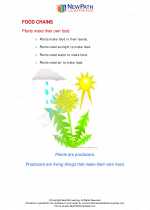 Food Chains
Food Chains  Activity Lesson
Activity Lesson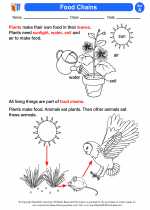 Food Chains
Food Chains  Worksheet/Answer key
Worksheet/Answer key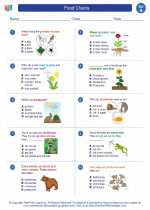 Food Chains
Food Chains  Worksheet/Answer key
Worksheet/Answer key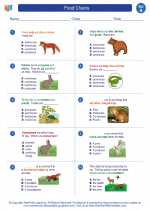 Food Chains
Food Chains  Worksheet/Answer key
Worksheet/Answer key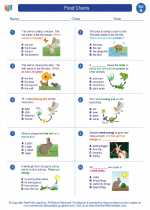 Food Chains
Food Chains  Worksheet/Answer key
Worksheet/Answer key Food Chains
Food Chains  Vocabulary/Answer key
Vocabulary/Answer key Food Chains
Food Chains  Vocabulary/Answer key
Vocabulary/Answer key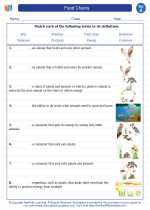 Food Chains
Food Chains 

 Activity Lesson
Activity Lesson
 Worksheet/Answer key
Worksheet/Answer key
 Worksheet/Answer key
Worksheet/Answer key
 Worksheet/Answer key
Worksheet/Answer key
 Worksheet/Answer key
Worksheet/Answer key
 Vocabulary/Answer key
Vocabulary/Answer key
 Vocabulary/Answer key
Vocabulary/Answer key

The resources above cover the following skills:
LIFE SCIENCE
From Molecules to Organisms: Structures and Processes
Design a solution to a human problem by using materials to imitate how plants and/or animals use their external parts to help them survive, grow, and meet their needs (e.g., outerwear imitating animal furs for insulation, gear mimicking tree bark or shells for protection).